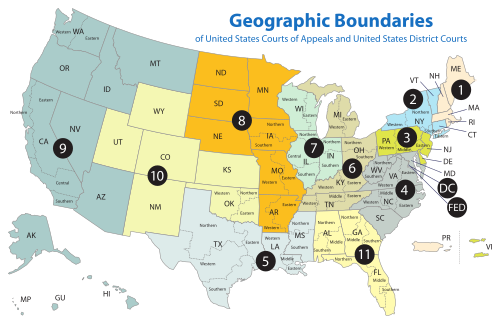External links
| Courts of appeals | |
|---|---|
| District courts |
|
| Specialty courts | |
| Territorial courts | |
| Extinct courts | |
| Note | American Samoa does not have a district court or federal territorial court; federal matters there go to the District of Columbia, Hawaii, or its own Supreme Court. |
Highest judicial bodies in the United States | |
|---|---|
| Federal courts | |
| State supreme courts |
|
| Territorial supreme courts | |
| Obsolete | |
| Complete list |
|
| Constitutional law and legislation | |||||
|---|---|---|---|---|---|
| Courts of the United States |
| ||||
| Education | |||||
| Types of law | |||||
